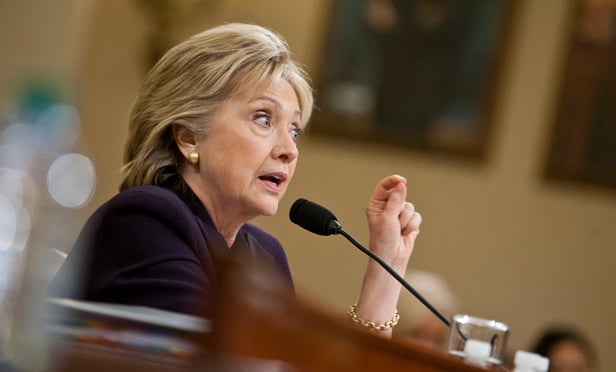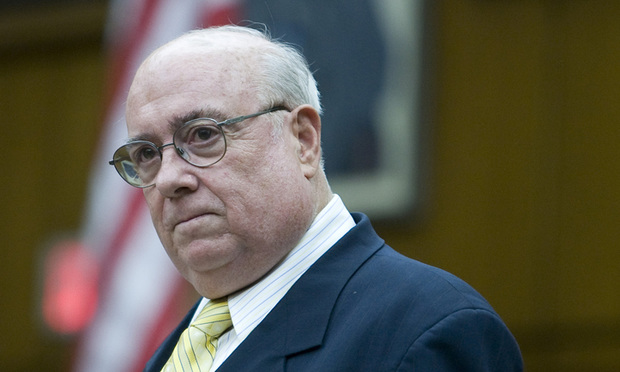Hillary Clinton's Appeal Argues No 'Extraordinary Circumstances' Justify Deposition
A Washington federal trial judge said Clinton and a former longtime aide must be deposed in a public-records suit about Clinton's use of a private email server. The impending depositions are "inappropriate, unnecessary, and a clear abuse of discretion," lawyers at Williams & Connolly and Wilkinson Walsh contend.
March 16, 2020 at 03:16 PM
7 minute read
 Former Secretary of State Hillary Clinton testifies during a House hearing of the Select Committee on Benghazi on Oct. 22, 2015. Photo by Diego M. Radzinschi/ ALM
Former Secretary of State Hillary Clinton testifies during a House hearing of the Select Committee on Benghazi on Oct. 22, 2015. Photo by Diego M. Radzinschi/ ALM
Lawyers for Hillary Clinton are appealing a Washington judge's order requiring her to sit for a deposition in a public-records suit that confronted her use of a private email server as the U.S. secretary of state, setting up a fresh test of the high bar that generally blocks lawyers from getting a chance to question current and former top government officials in person.
Clinton and a former longtime aide, Cheryl Mills, who also was subject to the judge's order allowing a deposition, on Friday filed their challenge in the U.S. Court of Appeals for the D.C. Circuit. The D.C. Circuit has long grappled with the "extraordinary circumstances," as described in previous court rulings, that are necessary to compel a high-level official to sit and answer questions in a lawsuit. The standard is often impossible to meet.
The appeal confronts an order issued March 2 by U.S. District Judge Royce Lamberth in the Freedom of Information Act case Judicial Watch v. State Department. The suit, filed in 2014 by the conservative advocacy group, sought State Department communication, including Clinton-related emails, about the 2012 terror attack at the U.S. government mission in Benghazi, Libya. Ambassador J. Christopher Stevens was among four Americans killed in the attack.
Clinton is represented by a team from Williams & Connolly, including partners David Kendall and Katherine Turner. The litigation boutique Wilkinson Walsh, including name partner Beth Wilkinson, represents Mills. Mills has already been deposed once before about matters related to Clinton's use of a private email server, and Clinton has already provided written answers in a related suit about her emails. Both contend there is no need for any further questioning, and that Judicial Watch hasn't met the "extraordinary circumstances" threshold for a deposition.
"The general rule against depositions applies to former officials such as Secretary Clinton and Ms. Mills," Kendall wrote in the new D.C. Circuit filing. "That is because the rule is intended in part to preserve 'the integrity of the administrative process' by limiting judicial inquiries into an official's reasons for taking official actions."
The impending depositions of Clinton and Mills, their lawyers argued, are "inappropriate, unnecessary, and a clear abuse of discretion."
Lawyers for Clinton and Mills also contend that Lamberth's order "inappropriately discounts this court's prior finding that there are no remaining recoverable emails, the extraordinary discovery that Judicial Watch has already obtained, and the vast public record on Secretary Clinton's emails." The attorneys point to several other cases where the D.C. Circuit blocked the deposition of a high-ranking government official.
Judicial Watch's president, Tom Fitton, on Friday called Clinton's D.C. Circuit appeal a "desperate act" designed "to delay truth and accountability for her email conduct and how it impacted the people's 'right to know' under FOIA."
Clinton's use of a private email server during her service as an Obama-era secretary of state provided political fodder to Republicans in the run-up to the 2016 presidential election, and the private email system spawned litigation over State Department public records. Then-FBI Director James Comey announced that summer the bureau was not recommending any criminal charges over Clinton's storage and dissemination of sensitive information on the private server.
Clinton has responded in writing to questions in a related public-records suit before U.S. District Judge Emmet Sullivan in Washington. But Lamberth said those responses, to so-called interrogatories, were insufficient to an understanding of Clinton's state of mind as it relates to using a private server for official State Department business. Lamberth said Clinton can be deposed "on matters concerning her reasons for using a private server and her understanding of State's records management obligations."
Lamberth said Clinton's written answers "were either incomplete, unhelpful, or cursory at best. Simply put, her responses left many more questions than answers."
"The court has considered the numerous times in which Secretary Clinton said she could not recall or remember certain details in her prior interrogatory answers," Lamberth wrote. "In a deposition, it is more likely that plaintiff's counsel could use documents and other testimony to attempt to refresh her recollection." Lamberth added: "The court agrees with Judicial Watch—it is time to hear directly from Secretary Clinton."
 U.S. District Judge Royce Lamberth in Washington. Credit: Diego M. Radzinschi / The NLJ
U.S. District Judge Royce Lamberth in Washington. Credit: Diego M. Radzinschi / The NLJClinton's lawyers at Williams & Connolly resisted Judicial Watch's demand for a deposition. They argued, among other things, that the group had a chance, and passed it up, to ask additional written questions of Clinton in the related lawsuit in Sullivan's court in Washington. Kendall also argued in a filing in the trial court that Judicial Watch cannot show "extraordinary circumstances" justifying any further discovery from a "former Cabinet Secretary in light of the previously obtained discovery and the public record, let alone a need for a deposition."
"Secretary Clinton has spoken about her use of private email before Congress, the FBI, and the media. The Benghazi Select Committee, the State Department Inspector General, and the FBI all conducted inquiries and made findings on her use of private email," Kendall wrote in Clinton's D.C. Circuit filing. Clinton has testified under oath that she used private email for convenience, her lawyers said in court filings.
Mill's attorneys at Wilkinson Walsh contend Judicial Watch is not entitled to depose her for a second time. "The mere fact that a party gains some new understanding, however minute, does not justify a re-deposition of a witness," the lawyers said. "If that were the rule, there would be no limits to discovery at all, and witnesses could be deposed time and again as information developed over the course of a case."
As Clinton presses her appeal, another Washington court could be forced to weigh a request from Amazon.com Inc. to depose President Donald Trump in a government-contracts case involving a $10 billion Pentagon contract. Amazon's lawyers at Morrison & Foerster and Gibson, Dunn & Crutcher argue that Trump's public animus of Amazon and its chief executive, Jeff Bezos, played into the Pentagon's decision to award a 10-year cloud contract to Microsoft Corp.
Separately, Trump's personal lawyers are challenging a New York judge who said Trump must appear for a deposition in a suit that claimed Trump Organization employees assaulted protesters outside New York's Trump Tower in 2015.
In 2018, the Trump Justice Department successfully blocked the deposition of Wilbur Ross, the U.S. commerce secretary, in a suit over the administration's efforts to add a citizenship question to the 2020 census. A trial judge's order permitting a deposition of Ross was an "extraordinary and disfavored step," the Justice Department told the Supreme Court.
Referencing a 2010 ruling in the Eleventh Circuit, DOJ lawyers said: "A district court should rarely, if ever, compel the attendance of a high-ranking official in a judicial proceeding."
Read more:
Summer Zervos' Lawyer Subpoenaed Hope Hicks for Testimony in Trump Defamation Suit
Amazon's Lawyers Want to Depose Trump in Suit Over $10B Pentagon Contract
'Extraordinary Circumstances': A Brief History of Top Federal Officials Ordered to Testify
This content has been archived. It is available through our partners, LexisNexis® and Bloomberg Law.
To view this content, please continue to their sites.
Not a Lexis Subscriber?
Subscribe Now
Not a Bloomberg Law Subscriber?
Subscribe Now
NOT FOR REPRINT
© 2025 ALM Global, LLC, All Rights Reserved. Request academic re-use from www.copyright.com. All other uses, submit a request to [email protected]. For more information visit Asset & Logo Licensing.
You Might Like
View All
Dissenter Blasts 4th Circuit Majority Decision Upholding Meta's Section 230 Defense
5 minute read
Justice 'Weaponization Working Group' Will Examine Officials Who Investigated Trump, US AG Bondi Says

Judge Pauses Deadline for Federal Workers to Accept Trump Resignation Offer

Judge Accuses Trump of Constitutional End Run, Blocks Citizenship Order
3 minute readLaw Firms Mentioned
Trending Stories
- 1Microsoft Becomes Latest Tech Company to Face Claims of Stealing Marketing Commissions From Influencers
- 2Coral Gables Attorney Busted for Stalking Lawyer
- 3Trump's DOJ Delays Releasing Jan. 6 FBI Agents List Under Consent Order
- 4Securities Report Says That 2024 Settlements Passed a Total of $5.2B
- 5'Intrusive' Parental Supervision Orders Are Illegal, NY Appeals Court Says
Who Got The Work
J. Brugh Lower of Gibbons has entered an appearance for industrial equipment supplier Devco Corporation in a pending trademark infringement lawsuit. The suit, accusing the defendant of selling knock-off Graco products, was filed Dec. 18 in New Jersey District Court by Rivkin Radler on behalf of Graco Inc. and Graco Minnesota. The case, assigned to U.S. District Judge Zahid N. Quraishi, is 3:24-cv-11294, Graco Inc. et al v. Devco Corporation.
Who Got The Work
Rebecca Maller-Stein and Kent A. Yalowitz of Arnold & Porter Kaye Scholer have entered their appearances for Hanaco Venture Capital and its executives, Lior Prosor and David Frankel, in a pending securities lawsuit. The action, filed on Dec. 24 in New York Southern District Court by Zell, Aron & Co. on behalf of Goldeneye Advisors, accuses the defendants of negligently and fraudulently managing the plaintiff's $1 million investment. The case, assigned to U.S. District Judge Vernon S. Broderick, is 1:24-cv-09918, Goldeneye Advisors, LLC v. Hanaco Venture Capital, Ltd. et al.
Who Got The Work
Attorneys from A&O Shearman has stepped in as defense counsel for Toronto-Dominion Bank and other defendants in a pending securities class action. The suit, filed Dec. 11 in New York Southern District Court by Bleichmar Fonti & Auld, accuses the defendants of concealing the bank's 'pervasive' deficiencies in regards to its compliance with the Bank Secrecy Act and the quality of its anti-money laundering controls. The case, assigned to U.S. District Judge Arun Subramanian, is 1:24-cv-09445, Gonzalez v. The Toronto-Dominion Bank et al.
Who Got The Work
Crown Castle International, a Pennsylvania company providing shared communications infrastructure, has turned to Luke D. Wolf of Gordon Rees Scully Mansukhani to fend off a pending breach-of-contract lawsuit. The court action, filed Nov. 25 in Michigan Eastern District Court by Hooper Hathaway PC on behalf of The Town Residences LLC, accuses Crown Castle of failing to transfer approximately $30,000 in utility payments from T-Mobile in breach of a roof-top lease and assignment agreement. The case, assigned to U.S. District Judge Susan K. Declercq, is 2:24-cv-13131, The Town Residences LLC v. T-Mobile US, Inc. et al.
Who Got The Work
Wilfred P. Coronato and Daniel M. Schwartz of McCarter & English have stepped in as defense counsel to Electrolux Home Products Inc. in a pending product liability lawsuit. The court action, filed Nov. 26 in New York Eastern District Court by Poulos Lopiccolo PC and Nagel Rice LLP on behalf of David Stern, alleges that the defendant's refrigerators’ drawers and shelving repeatedly break and fall apart within months after purchase. The case, assigned to U.S. District Judge Joan M. Azrack, is 2:24-cv-08204, Stern v. Electrolux Home Products, Inc.
Featured Firms
Law Offices of Gary Martin Hays & Associates, P.C.
(470) 294-1674
Law Offices of Mark E. Salomone
(857) 444-6468
Smith & Hassler
(713) 739-1250








